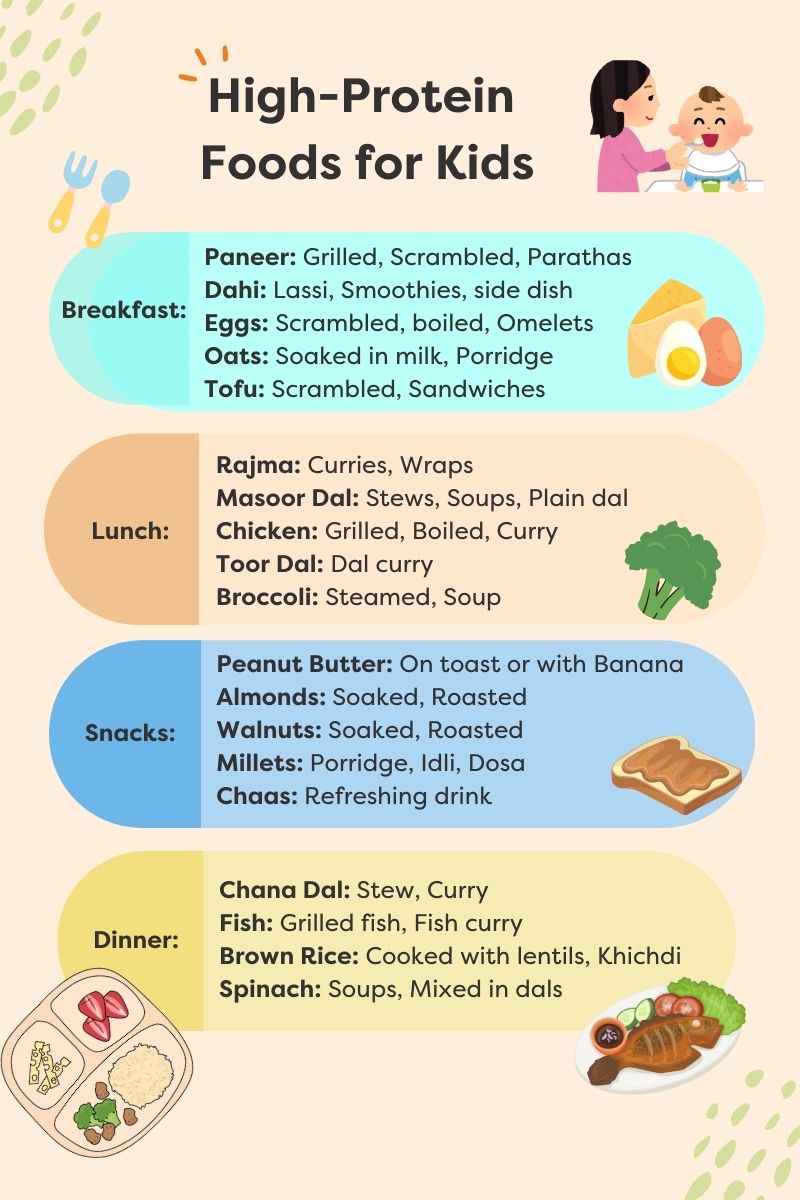Your baby seems to have endless energy all day because their bodies are constantly developing and growing. Their bodies need the protein fuel to keep healthily going on this journey. Proteins are the building blocks of the human body. It will give your child’s body the ability to build strong muscles and bones and will keep them healthy.
Why is Protein Important for Kids?
Protein is the superhero of your child’s body; it keeps them healthy and helps them with the following:
- To Help Them Grow Strong: From building bones to muscles, protein plays a very important role in your baby’s physical growth.
- To Provide Them with Energy: Protein-rich foods for babies keep their bodies feeling full all day as they run around and feel the energy.
- To Boost Immunity: If your baby’s immune system is strong, it will be able to fight off diseases with ease. Protein helps boost their immune system, keeping them away from illnesses.
- To Ensure They Develop Properly: Protein helps your child’s brain to develop well and improves their cognitive function.
How Much Protein Do Kids Need?
The amount of protein your child needs depends on their age and level of activity. Here is a general guideline:
- Toddlers (1-3 years): Around 13 – 16 gms per day
- Preschoolers (4-6 years): Around 19-22 gms per day
- School-aged children (7-10 years): Around 25-30 gms per day
High-Protein Foods for Kids:

Let’s explore some protein-rich foods and snacking options you can prepare for your children:
Protein-Rich Breakfast Foods for Kids:
- Paneer: Paneer or cottage cheese is a very versatile protein option, which you can use in various dishes, like parathas, and sandwiches, or you can even grill it with veggies.
- Dahi: Full-fat yoghurt is an excellent source of protein and calcium. You can blend it in smoothies, make lassi from it, or serve it with a side dish.
- Eggs: Scrambled, boiled, or scrambled, however, your child prefers them, eggs are excellent sources of protein. You can easily add these to their regular breakfast.
- Oats: You can make your child’s mornings powerful with yummy porridge, oats, milk, and fruits. You can also add some nuts to it.
- Tofu: This is a plant-based protein. You can scramble it with veggies or even add it to sandwiches, for a vegetarian protein boost.
Protein-Rich Lunch Foods for Kids:
- Rajma or kidney beans: These are a source of protein in a big way. You can prepare curries; rice dishes and even wraps with them.
- Masoor dal or red lentils: Quick to cook and easy to digest, red lentils are great for stews, soups, and plain dal options. Along with being great sources of protein, foods like lentils, beans, and nuts are also rich in fiber. A balanced diet that includes both protein-rich and fibre rich foods helps in better digestion and sustained energy levels for growing kids
- Chicken: A grilled chicken dish or a chicken curry makes for a protein-packed lunch option.
- Quinoa: Quinoa is completely protein; it complements salad preparations and can also be eaten with veggies.
- Toor dal: A staple in many Indian households. It is a great source of protein.
- Broccoli: This veggie is full of protein. You can serve it steamed or add it to rice dishes for an extra protein boost.
Protein-Rich Dinner Foods for Kids:
- Chana dal: Enjoyed as a stew or added to curries, chana dal is a power-packed protein option.
- Fish: Fish is rich in protein and omega-3 fatty acids. You can add it to grilled dishes and curries.
- Brown rice: You can pair brown rice with lentils to make them protein-rich. Indian dishes like khichdi are something your children will love as well.
- Spinach or palak: This leafy green vegetable is made of plant-based protein and can be added to dals and soups.
Protein-Rich Snacks for Kids:
- Boiled eggs: Simple to prepare, easy to carry, and packed with protein, boiled eggs are a great anytime snack. You can add them to whole wheat bread or prepare an egg sandwich for variety.
- Peanut butter: you can spread the peanut butter on toast or add it to smoothies. You can also make a yummy peanut butter and banana sandwich that children tend to love for a quick protein boost.
- Almonds: You can give our baby ground almonds or add some to smoothies, to give your baby a perfect combination of healthy fats and proteins.
- Cashews and walnuts: These nuts have high protein content, you can ground them, give them to your baby in their porridge, or let them eat them as a snack as well.
- Millets (bajra & ragi): Millets are a versatile grain that can be used in porridge or even in idli and dosa batters. They are another excellent source of protein and fiber.
- Chaas or buttermilk: This is a pro-biotic drink that is refreshing and a beverage that is rich in protein.
Benefits of Including Protein in Kids’ Diets
If you include these dishes in your child’s meals and snacks. You are helping them get a balanced diet that supports their development and growth. It helps them:
- Stay full and satisfied.
- Grow their muscles and repair muscles as well.
- Build strong bones and teeth.
- Build a healthy immune system.
- Develop their brain and function better.
FAQs
What are the best sources of protein for kids?
- Dairy products like milk, yoghurt, and cheese
- Eggs
- Lean meats, poultry, and fish
- Beans, lentils, and tofu
- Nuts and seeds
- Whole grains
Can kids get enough protein from plant-based sources?
Yes, kids can get enough protein from plant-based sources. Legumes, tofu, tempeh, nuts, seeds, and whole grains. These are all good sources of protein.
How can I encourage my child to eat more protein-rich foods?
- Make protein-rich foods fun and appealing.
- Involve your child in meal planning and preparation.
- Offer a variety of protein-rich foods.
- Be a role model by eating protein-rich foods yourself.
How can I increase my child’s protein intake?
- Add protein-rich foods to meals and snacks.
- Use protein-rich ingredients in recipes.
- Consider protein supplements under the guidance of a healthcare professional.
Preparing a balanced diet with a lot of different options during the day is the key to a healthy diet. This way you can ensure that your baby gets all the vitamins, minerals, and nutrients they need throughout the day. You can make sure your child is developing well and reaching their full potential by giving them the right fuel in the form of the right food.
















Subscribe to our newsletter
[contact-form-7 id="12706" title="Newsletter Form for post page"]Our Related Blogs
Yoga Benefits, Activities, and Poses for Preschoolers
For preschoolers, yoga isn’t about perfection but about giggles and benefits. So, are you curious how a simple stretch can support a child’s focus, flexibility, and emotional well-being? Let’s roll...
Year-End Reflection and Goal Setting for Children
Parenting is a journey filled with the brightest moments and valuable lessons, both for us and our children. As the year draws to a close, it’s the perfect time to...
Why Parents Trust KLAY Preschools in Sector 65 Gurgaon
Finding the right preschool and daycare in Gurgaon can feel overwhelming. Parents look for a place that is safe, nurturing, and focused on holistic development. KLAY Preschool and Daycare in...